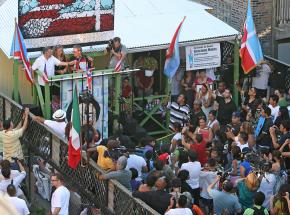Freed after 30 years as a political prisoner
reports on the long struggle for fighter against U.S. colonialism.
CARLOS ALBERTO Torres, the longest-serving Puerto Rican political prisoner in U.S. history, finally became a free man on July 26 after more than 30 years behind bars.
Torres was convicted of seditious conspiracy to overthrow the U.S. government by force. In reality, he was found guilty of being a member of the Armed Forces of National Liberation (FALN, by its Spanish initials), an underground national liberation organization committed to fighting against U.S. colonialism in Puerto Rico and achieving self determination.
During the 1970s, the FALN took responsibility for a number of bombings of buildings in the Chicago area, none of which resulted in injury or death. Torres wasn't accused of taking part in the bombings, only of being a FALN member.
Torres was arrested in April 1980 in Evanston, Ill., along with 10 other Puerto Rican activists. This group and other FALN members arrested later were convicted and given sentences ranging from 35 years to life. These prison terms were far out of proportion to the sentences that would have been given to defendants accused of similar crimes, but not affiliated to radical organizations. They were meant as punishment for the FALN members' revolutionary politics, pure and simple.

The FALN members declared themselves prisoners of war, arguing that the U.S. government was carrying out a military occupation of Puerto Rico, and that under international law, colonialism is a crime against which oppressed people have the right to fight.
The seditious conspiracy charge has a long history of being applied to those who resist the U.S. occupation of Puerto Rico.
In the 1930s, it was used against Puerto Rican nationalists led by Pedro Albizu Campos after an uprising against the U.S.-imposed colonial government. It was also used in 1954 against four nationalists who carried out an armed attack inside the U.S. Capitol Building that wounded five congressmen.
In a sad irony, Lolita Lebrón, leader of the 1954 attack, died a few days after Torres' release. Lebrón was 89, but was still active until recently, taking part in demonstrations on the island in solidarity with the strike by students at the University of Puerto Rico.
Prisoners of war like Torres and Lebrón were accused of being terrorists for using violence to challenge the power of the U.S. government. But the violence of the U.S. against the Puerto Rican people, though mostly unknown to Americans, has been many times more deadly and vicious.
Puerto Rico is a colony--a territory that belongs to the U.S., but whose citizens don't have full rights, even to participate in national elections. Puerto Ricans can enlist in the military--they could be conscripted until the draft was ended--but their votes for the commander-in-chief don't count under the Electoral College system.
During the more than 100 years that the U.S. has ruled Puerto Rico, the federal government has carried out a series of crimes that include experimenting with the chemical weapon Agent Orange, sterilizing approximately one-third of Puerto Rican women during the 1930s and 1970s, and using the islands of Culebra, and then Vieques, for military target practice for 60 years, at the cost of turning the land and water into a toxic waste dump and causing an increase in cancer rates among residents.
Puerto Rico's agricultural system was subordinated to the U.S. economy--basic crops that used to be grown on the island are now imported from the U.S.--and its education system is controlled by Washington. The U.S. maintains its colonial power in nearly every aspect of the Puerto Rican political and economic daily life.
WHEN I was in high school, I and some other classmates formed a political organization for the independence of Puerto Rico. One of our first activities was to become part of the campaign to liberate the prisoners of war.
We divided the POW's names between us. That's how I met Dylcia Pagán, Carmen Valentín, Edwin Cortés, Luis Rosa and Oscar López Rivera. Some would call on special occasions, and we would talk.
These are the amazing people who have been surviving torture and mistreatment by a system that fears people like them.
Not only did the Puerto Rican political prisoners suffer disproportionately long sentences even though they were never accused of killing anyone, but the treatment they received in prison was degrading and abusive--a clear attempt to break them as human beings, and with that, their political convictions and spirit to struggle.
During their time in prison, the POWs were subject to constant searches, strip searches and transfers from one prison to another, without their families being notified. Oscar López Rivera, for example, spent more than seven years in solitary confinement for no justifiable reason, with no human contact besides prison guards.
The FALN prisoners were leading members of their community before they were convicted. Several helped found institutions that are centers of Puerto Rican culture in Chicago, such as Pedro Albizu Campos High School. All were activists against police brutality, discrimination and lack access to services for the poor, among many other causes.
In prison, they continued serving their community by teaching classes to other prisoners, ranging from literacy, Spanish, music, arts and fitness, and developing initiatives to improve the living conditions of the prisoners.
In 1999, most of the POWs were released after President Bill Clinton offered them clemency with the condition that they renounce violence. Because Carlos Alberto Torres had been on the FBI's most-wanted list during the 1970s, he was not included in the offer of clemency.
Members of the Puerto Rican community in Chicago celebrated Torres' release last week, and he was also greeted as a hero when he returned to the island a few days later. But the victory is bittersweet because Oscar López Rivera remains in prison. The campaign to free Oscar is expected to intensify its efforts to bring him home soon.


